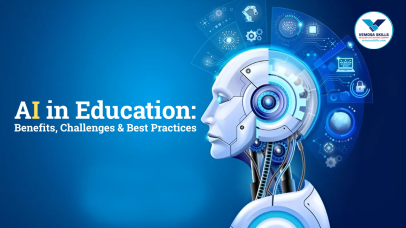AI in Education: Benefits, Challenges & Best Practices
Importance of AI in Education and its Impact
Nowadays, the world is changing very fast. Many new things and technologies are coming. One such technology is Artificial Intelligence (AI). AI means the ability of computers and machines to think and work like humans. This technology is now being used in every field, and education is also not untouched by it.
By using AI in education, we can make studies easier and more interesting for children and students. With the help of AI, many big changes can come in education. This not only benefits the students, but also helps the teachers a lot. In this article, we will know what the importance of AI in education is, what its benefits are, and what challenges it can pose.
Benefits of AI in education
1. Personalized study experience
With the help of AI, now every student's way of studying can be different. Suppose a student is having difficulty in mathematics; then AI can help that child in a special way. If someone is having difficulty understanding some topics of science, then AI can explain them slowly and in an easy way. Every child is different, and keeping this in mind, AI can teach them in a better way.
2. Online Tutoring System
Many online tutors or chatbots made of AI can help children. These tutors answer children's questions immediately and help them with their homework. If the child has difficulty understanding any subject, then this AI tries to explain it. Apart from this, children get these facilities 24/7, that is, they can ask questions related to their studies at any time.
3. Monitoring the performance of students in the class
With the help of AI, teachers can track the performance of students well. Teachers can see which children are weak in which subjects, and who needs more help. Along with this, teachers can also know which children are performing well and what new things can be given to them so that their knowledge increases further.
4. Help in class administration
AI helps not only in studies but also in the administration of schools. Teachers get help in doing student records, exam results, and other administrative work. AI takes less time in these tasks, and teachers get more time to teach students. This also makes the school work run smoothly.
5. Accessible Education
AI can also be used for students with disabilities. For example, if a student has a problem hearing, AI can give him information in written form. Apart from this, for children who cannot speak, voice can be converted into text with the help of AI. In this way, AI also gives equal educational opportunity to students with disabilities.
6. Better time management
AI helps both teachers and students to use their time better. For example, AI can know how much time a student should take to complete a subject, and can make suggestions accordingly. Also, teachers can improve their schedules with the help of AI, so that they have more time for students.
Some Risks and Challenges of AI in Education
1. Data Security and Privacy
Using AI collects a lot of data about students (such as their name, marks, and performance). This data can be very sensitive, and its security is important. If this data goes into the wrong hands, it can be harmful to children. Therefore, schools and teachers have to adopt good measures to keep this data safe.
2. Lack of equality for all
AI can be very helpful in education, but this technology cannot be used everywhere. Some poor students do not have access to good computers or the internet. Because of this, the benefits of AI may be limited to some children. Therefore, the government and schools will have to take steps to make this technology accessible to all students so that no child is left behind.
3. Lack of human contact
AI can provide children with a lot of information, but AI does not have the humanity and emotions that a teacher can give to children. Children need not only information but also encouragement, empathy, and humanity. If children are educated only through AI, their mental development and emotional support may be affected.
4. Threat to jobs
The increasing use of AI can also lead to the loss of jobs for some people. For example, some administrative work that was previously done by humans will now be done by AI. This means that some people may lose their jobs. It will be necessary to pay attention to this and create new job opportunities.
Measures to Successfully Implement AI in Education
1. Implement AI correctly
The use of AI will be beneficial only when it is implemented correctly. Teachers and schools should use AI after understanding its advantages and disadvantages. For this, schools should provide proper training about AI, so that it can be used properly.
2. Making children and parents aware of AI
It is also important to explain AI to children and their parents. They should be told how AI can help them in their studies and what its benefits are. Apart from this, children should also be advised to be careful in the use of AI.
3. Making new education policies
Keeping in mind the increasing use of AI, new education policies should be made. This can ensure that AI is used for the benefit of students, not for their harm. These policies should include important things like privacy, equality, and the human interaction of students.
Future of AI in Education
The future of AI is very bright. In the coming times, AI will become even more advanced and will bring more changes in education. New tools and technologies will come, which will help students to learn even better. For example, with the help of Virtual Reality (VR) and Augmented Reality (AR), children can be shown such a world where they can go beyond the books and feel objects and events.
Along with this, AI will establish more communication between teachers and students, which will make education even more effective. With the help of AI, every student will be able to get an education according to their need. The use of AI in education is just a beginning, and its impact will be even greater in the coming years.
Conclusion
AI technology has brought many positive changes in the field of education, and this technology is likely to bring more changes in the future. However, it also has some risks and challenges, but these problems can be solved by using it in the right way. If we use AI in the right direction, it can make our education system better and give children a bright future.





